Ford Transit Transporter VS Peugeot 308 SW – Specs, Efficiency & Price Comparison
Which model is the better choice – the Ford Transit Transporter or the Peugeot 308 SW? We compare performance (269 HP vs 180 HP), boot capacity ( vs 608 L), efficiency (21.30 kWh7.90 L vs 15.30 kWh1.30 L), and of course, the price (39900 £ vs 29500 £).
Find out now which car fits your needs better!
The Ford Transit Transporter (Cargo Van) is powered by a Diesel or Electric engine and comes with a Manuel or Automatic transmission. In comparison, the Peugeot 308 SW (Estate) features a Diesel, Plugin Hybrid, Electric or Petrol MHEV engine and a Automatic gearbox.
When it comes to boot capacity, the Ford Transit Transporter offers , while the Peugeot 308 SW provides 608 L – depending on what matters most to you. If you’re looking for more power, you’ll need to decide whether the 269 HP of the Ford Transit Transporter or the 180 HP of the Peugeot 308 SW suits your needs better.
There are also differences in efficiency: 21.30 kWh7.90 L vs 15.30 kWh1.30 L. In terms of price, the Ford Transit Transporter starts at 39900 £, while the Peugeot 308 SW is available from 29500 £.
Compare all the key specs now and find out which model fits your lifestyle best!
Ford Transit Transporter
The Ford Transit Transporter has long been a staple in the commercial vehicle sector, renowned for its reliability and versatility. It offers a comfortable cabin with a modern design that enhances the driving experience, making long journeys more enjoyable. With a focus on practicality, the Transit provides ample cargo space, meeting the demands of businesses and individual users alike.
details @ media.ford.com
@ media.ford.com
 @ media.ford.com
@ media.ford.com
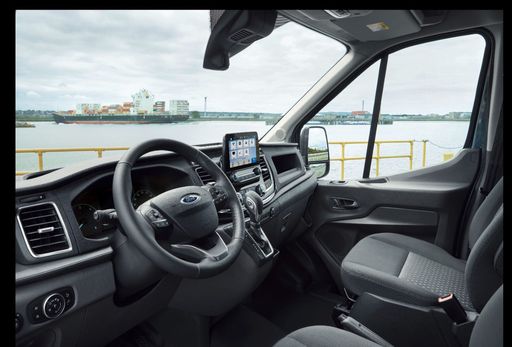 @ media.ford.com
@ media.ford.com
Peugeot 308 SW
The Peugeot 308 SW impresses with its stylish design and practical nature, making it a standout in the estate car category. Its spacious interior is complemented by a high-quality finish, offering comfort for both the driver and passengers. The vehicle also boasts advanced technology features, ensuring a modern and enjoyable driving experience.
details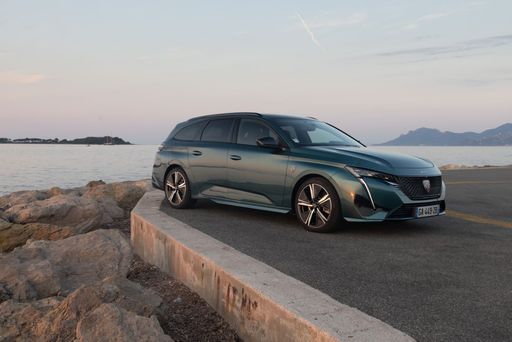 @ media.stellantis.com
@ media.stellantis.com
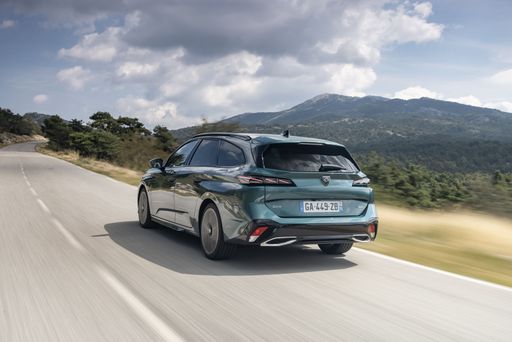 @ media.stellantis.com
@ media.stellantis.com
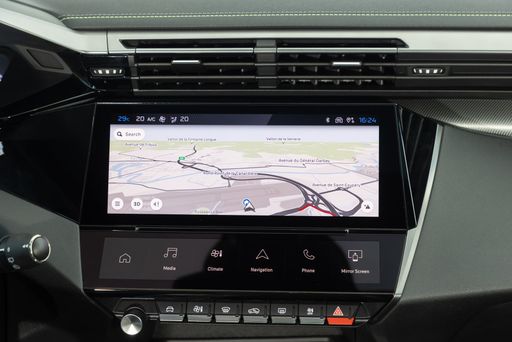 @ media.stellantis.com
@ media.stellantis.com
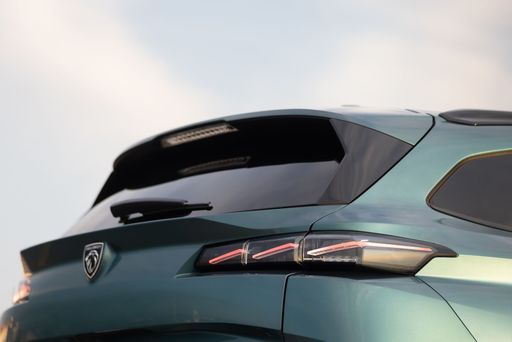 @ media.stellantis.com
@ media.stellantis.com
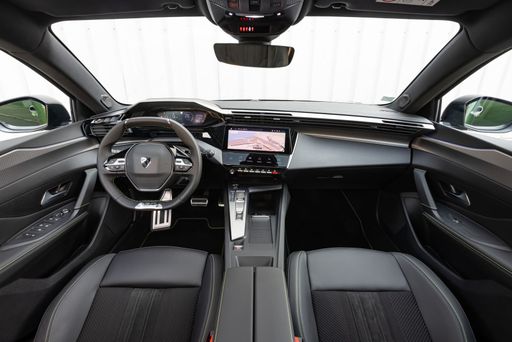 @ media.stellantis.com
@ media.stellantis.com

|

|
|
|
|
Costs and Consumption |
|
|---|---|
|
Price
39900 - 69100 £
|
Price
29500 - 42600 £
|
|
Consumption L/100km
7.9 - 10.3 L
|
Consumption L/100km
1.3 - 5.1 L
|
|
Consumption kWh/100km
21.3 - 32 kWh
|
Consumption kWh/100km
15.30 kWh
|
|
Electric Range
247 - 317 km
|
Electric Range
57 - 410 km
|
|
Battery Capacity
68 kWh
|
Battery Capacity
11.3 - 51 kWh
|
|
co2
0 - 270 g/km
|
co2
0 - 134 g/km
|
|
Fuel tank capacity
70 L
|
Fuel tank capacity
40 - 53 L
|
Dimensions and Body |
|
|---|---|
|
Body Type
Cargo Van
|
Body Type
Estate
|
|
Seats
3 - 6
|
Seats
5
|
|
Doors
4
|
Doors
5
|
|
Curb weight
2074 - 2765 kg
|
Curb weight
1475 - 1791 kg
|
|
Trunk capacity
-
|
Trunk capacity
548 - 608 L
|
|
Length
5531 - 6704 mm
|
Length
4636 mm
|
|
Width
2059 mm
|
Width
1852 mm
|
|
Height
2530 - 2778 mm
|
Height
1442 mm
|
|
Payload
735 - 2607 kg
|
Payload
409 - 500 kg
|
Engine and Performance |
|
|---|---|
|
Engine Type
Diesel, Electric
|
Engine Type
Diesel, Plugin Hybrid, Electric, Petrol MHEV
|
|
Transmission
Manuel, Automatic
|
Transmission
Automatic
|
|
Transmission Detail
Schaltgetriebe, Automatikgetriebe
|
Transmission Detail
Automatikgetriebe, Automat. Schaltgetriebe (Doppelkupplung)
|
|
Drive Type
Front-Wheel Drive, Rear-Wheel Drive, All-Wheel Drive
|
Drive Type
Front-Wheel Drive
|
|
Power HP
105 - 269 HP
|
Power HP
130 - 180 HP
|
|
Acceleration 0-100km/h
-
|
Acceleration 0-100km/h
7.7 - 10.9 s
|
|
Max Speed
120 km/h
|
Max Speed
170 - 225 km/h
|
|
Torque
310 - 430 Nm
|
Torque
230 - 360 Nm
|
|
Number of Cylinders
4
|
Number of Cylinders
3 - 4
|
|
Power kW
77 - 198 kW
|
Power kW
96 - 133 kW
|
|
Engine capacity
1995 cm3
|
Engine capacity
1199 - 1598 cm3
|
General |
|
|---|---|
|
Model Year
2019 - 2024
|
Model Year
2023 - 2025
|
|
CO2 Efficiency Class
G, A
|
CO2 Efficiency Class
D, B, A, C
|
|
Brand
Ford
|
Brand
Peugeot
|
Ford Transit Transporter
Discovering the Ford Transit Transporter: A Blend of Tradition and Innovation
The Ford Transit Transporter has long been a staple in the commercial vehicle market, known for its reliability and versatility. As Ford continues its innovative journey, the Transit Transporter integrates modern technology and eco-friendly advancements, making it more appealing than ever. Here, we explore some of its key technical details and innovations.
Under the Bonnet: Engine Variants and Efficiency
The Ford Transit Transporter offers a variety of engine options to cater to diverse commercial needs. Among these, the 2.0 EcoBlue Diesel engine provides a robust selection of power outputs, ranging from 105 to 165 PS. Not just limited to traditional fuel, Ford also introduces the E-Transit line with electric motors generating up to 269 PS. This transition to electric is an essential step towards sustainability, achieving an impressive range of 247 to 317 km on a full charge.
Fuel Economy and Environmental Impact
When it comes to fuel efficiency, the Transit Transporter presents a competitive edge with diesel variants consuming between 7.9 to 10.3 L/100km. On the electric side, consumption levels are measured at 21.3 to 32 kWh/100km. Furthermore, the Transit’s CO2 emissions range from zero for electric models to 270 g/km for select diesel engines, placing the vehicle in varying CO2 efficiency classes from G to A.
Performance and Driving Dynamics
Designed for optimal performance, the vehicle’s torque output ranges from 310 to 430 Nm, facilitating smooth and powerful driving experiences across various terrains. The Transit Transporter boasts a maximum speed of 120 km/h, ensuring timely commutes and deliveries, crucial for business efficacy.
The Versatility of Drivetrain Options
The Ford Transit Transporter provides an array of drivetrain configurations, including front-wheel, rear-wheel and all-wheel drive. This adaptability enables the vehicle to tackle different driving conditions with ease, offering stability and resilience no matter the challenge.
Technology and Innovation on Board
Ford’s commitment to innovation is evident within the Transit Transporter’s interior. Intuitive features such as advanced driver-assistance systems, smart connectivity tools, and ergonomic seating arrangements ensure that both driver and passengers enjoy a seamless and comfortable journey, ideal for long rides or daily routines.
Crafted for Practicality and Comfort
With length variations extending from 5531 mm to 6704 mm, and height options from 2530 mm to 2778 mm, the Ford Transit Transporter offers expansive cargo space and flexible seating arrangements. Depending on the variant, seating options range from 3 to 6 seats, catering to diverse passenger and cargo needs.
A Future-Ready, Cost-Effective Choice
Price tags for the Ford Transit Transporter range from €46,589 to €80,611, accommodating different budget requirements. With monthly operation costs calculated between €1430 and €1991, the Transit remains a financially viable option for businesses seeking reliability and efficiency.
Conclusion: An Unyielding Commitment to Excellence
The Ford Transit Transporter stands as a testament to Ford’s dedication to marrying tradition with progress. With its diverse range of powertrains, technological integrations, and practical design, it continues to lead the commercial vehicle segment, ready to meet the challenges of modern mobility and sustainability.
Peugeot 308 SW
Introducing the Peugeot 308 SW: A Harmony of Style and Innovation
The Peugeot 308 SW is not just another estate car; it's a blend of sophisticated design and cutting-edge technology that offers something for every driver. Whether you're looking for fuel efficiency, dynamic performance, or state-of-the-art features, the Peugeot 308 SW stands out in the competitive market of family cars.
Performance Meets Efficiency
Under the bonnet, the Peugeot 308 SW comes with a range of engine options to suit varied preferences. The model offers petrol mild-hybrids, diesels, pure petrol, and even plug-in hybrids, ensuring efficient performance with a range between 130 to 225 PS. For those inclined towards green energy, the all-electric variant provides a dynamic driving experience with zero emissions.
The plug-in hybrid versions boast an impressive fuel consumption of 1.3 L/100km, providing a seamless union of electrical efficiency and conventional horsepower. On the other hand, the all-electric model achieves a consumption of 15.7 kWh/100km, with an electric range of up to 410 km.
Technological Prowess
Step inside the Peugeot 308 SW, and you'll find a cabin that is as functional as it is stylish. The model comes with Peugeot’s latest i-Cockpit® technology, featuring a compact steering wheel and a large 10-inch touchscreen, making driving intuitive and comfortable. With an acceleration of 0-100 km/h in just 7.6 seconds in its top-tier models, you have a car that is responsive yet efficient.
The car is equipped with advanced driver-assistance systems that ensure a safer driving experience. Features like adaptive cruise control and lane-keep assist are standard across various trims, enhancing the overall safety quotient.
Design and Comfort
The Peugeot 308 SW's exterior design presents a dynamic yet elegant silhouette, perfectly capturing its dual nature of performance and comfort. With a length of 4636 mm and width of 1852 mm, it offers spacious interiors without compromising on style. The boot space ranges from 548 to 608 litres, providing ample storage for family trips.
Inside, passengers enjoy a plush experience with high-quality materials and state-of-the-art connectivity options. The car offers a choice of premium upholstery and sophisticated trims, ensuring comfort wherever your journey takes you.
Conclusion: The Ideal Family Car
The Peugeot 308 SW is more than just a car; it's a statement. With pricing starting from €30,150 to €48,440, it offers incredible value for money. The car’s diverse range of drivetrain options and technologically rich features make it a perfect companion for families seeking versatility and innovation in one package.
Whether it's the allure of electric power or the reliability of a petrol engine, the Peugeot 308 SW offers options that align with modern-day driving needs, proving that you really can have it all in an estate vehicle.
The prices and data displayed are estimates based on German list prices and may vary by country. This information is not legally binding.
